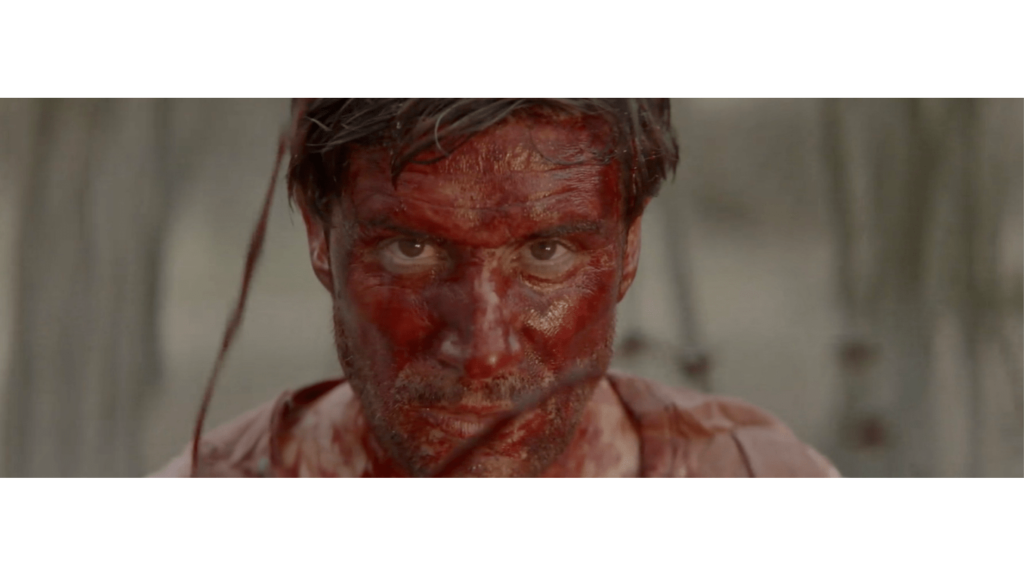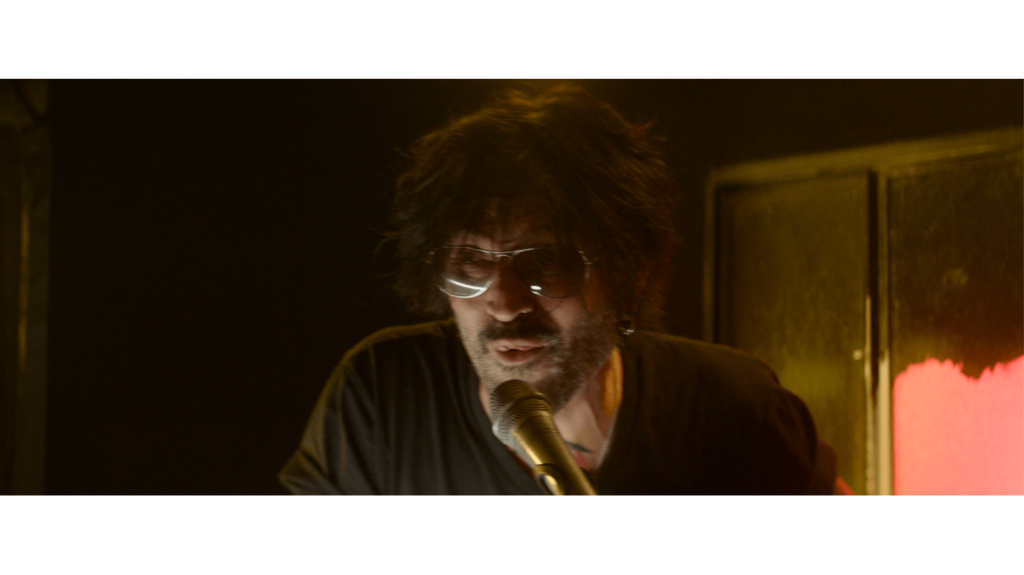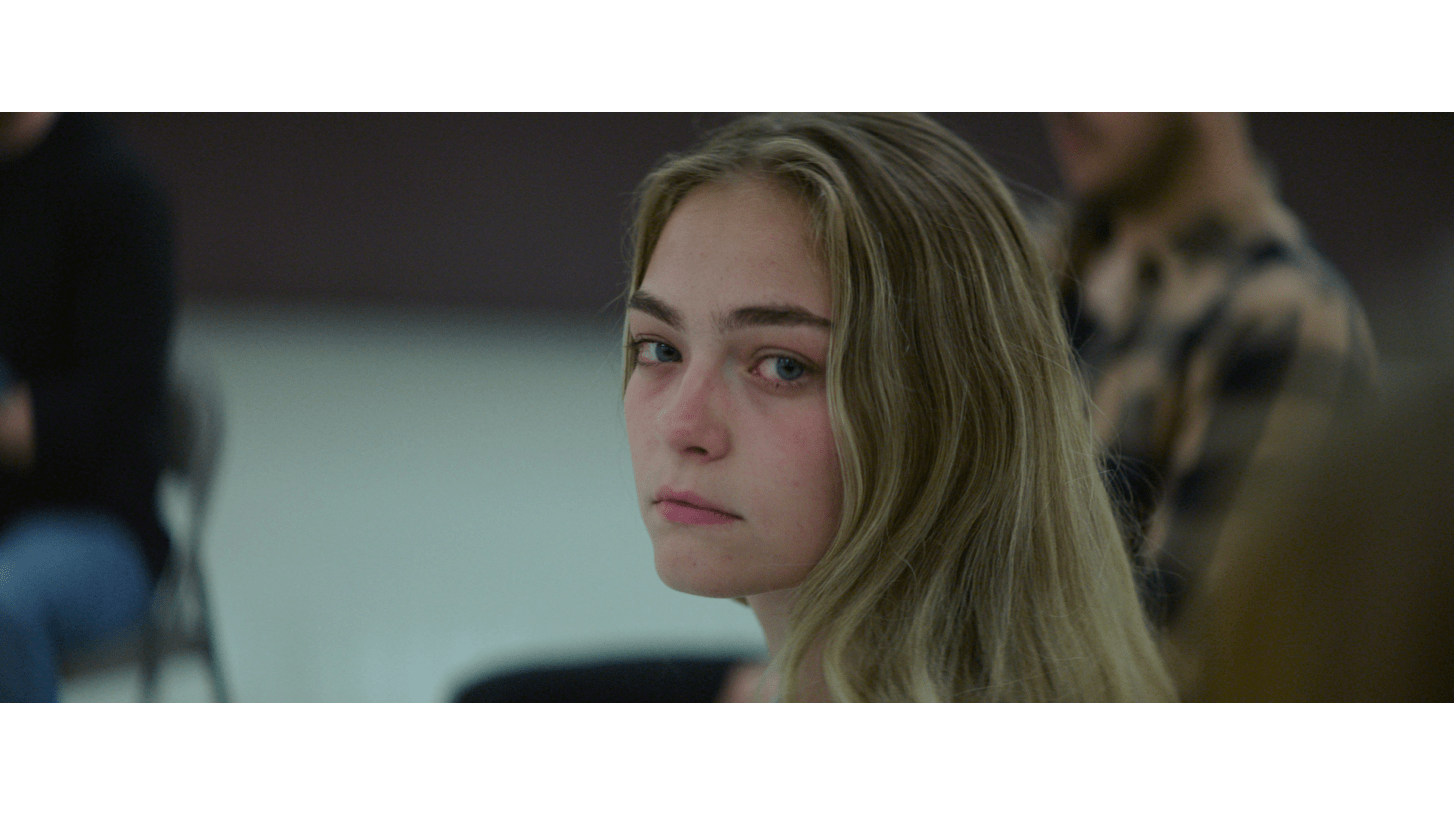The Retaliators
Directors: Samuel Gonzalez, Jr., Michael Lombardi, Bridget Smith
Writers: Darren and Jeff Allen Geare
Starring: Michael Lombardi, Geoff Menchaca, Joseph Gatt, Jacoby Shaddix
Pop Catholicism’s tropes and trappings have had American horror in a chokehold for decades now. A steady stream of exorcism flicks has poured out of this seemingly-fathomless font, challenged occasionally by significant outliers like A Girl Walks Home Alone At Night, The Witch, and The Vigil.
Now, a left-field contender has appeared: Better Noise Films’ debut horror flick The Retaliators might be termed “non-denominational Christian horror.” Does it work? Somewhat. However, this notably gory nu-metal bloodbath doesn’t push far enough.
“It’s better to keep evil alive.”
First, a fair warning: the film’s cold open is playing a long game, as two women traveling through New Jersey stop to fix their van’s flat tire and are summarily dispatched by… zombies?
“Not zombies,” a blood-caked man gasps before being dragged beneath the van, a scene the film won’t return to until its runtime is nearly gone. Peripherally, a Very Jersey Christmas is in progress, and we’re shown the improbably-named Pastor Bishop (Michael Lombardi, Rescue Me) and his two daughters being bullied by a nasty stranger at the Christmas tree lot. As a good pastor might, Bishop turns the other cheek to the man’s rudeness and permits him to make off with the family’s chosen tree.
This character sketch, in tandem with a question posed by the film’s opening voice-over, provides a neat encapsulation of both character and film arc. How many evil things can a good person do before they’re no longer good, wonders The Retaliators. The central limit, for a certain stripe of American Christian, does not exist. Is the position of pastor at odds with heroic masculinity? Naturally, a piercing notion!
Hero and Shadow
Bishop is established to be a good father–protective, humorous, non-threateningly ripped–a popular pastor, and a little fearful of relaxing the reins. As horror audiences know, the minute the father of a teenage blonde relaxes the reins, something bad comes rocketing around the corner. The bad thing is our ostensible villain, Ram (a mobbed-up Joseph Gatt, Game of Thrones), toting a rival mobster in his trunk and getting made by Sarah Bishop (Katie Kelly, Game of Silence) at a gas station.
To get rid of an unexpected witness, he runs her off the road, zip-ties her to her steering wheel, and sinks her car in a lake. This detour into stranger-danger is mere set-up for the arrival of the real villain, Marc Menchaca (Ozark) as Jed, a cop far beyond corrupt. Seemingly invested in solving the case of Sarah’s murder, Jed’s real motives are bloodier: disillusioned with the justice system, he hunts violent offenders released from prison, cages them in a cabin, and tortures the humanity out of them.
He catches Ram with ease, naturally. A dark wonderland tour ensues, as Ram’s gangland compatriots search for their missing brother additionally Bishop learns just what sort of town he’s raising his kids in (among other things, they let Tommy Lee DJ at a strip club). Soon enough, he’s faced with a decision that seems like no decision at all: enact his vengeance on his daughter’s murderer, or leave Ram to Jed’s demonic devices.

Post-9/11 Horror
Horror’s core function is to frighten, horrify, or disgust the audience. Many horror theorists suggest that horror media comments on the culture and society from which it arises. Setting aside scenes of weaponized car trunks, eye-gouging, shotgun blasts to the face–the likes of which disgust just about everyone–which audience are the Geares trying to frighten?
Chiefly The Retaliators feels like a period piece. Naturally due to its soundtrack and appearances from nu-metal luminaries such as Jacoby Shaddix (Papa Roach) and Zoltan Bathory (Five Finger Death Punch); its hero is a pastor of the type to employ a shredtastic worship band. Most crucially, its preoccupations and fears are pure white American suburbia circa 2004.
I was raised a white Christian in American suburbia in the 90s and 00s, so trust me on this. Everyone had a Baptist friend who said things like “you can’t even tell it’s Christian rock!” Every frustrated kid was faced with the choice between emo and nu-metal for their emotional outlet. And every teenage girl learned to fear assault… but never at the hands of someone close to her. If non-denominational suburbanites are this film’s audience, then their fears are indeed realized onscreen.
Their daughters are prey to threatening strangers, rather than trusted family or friends. The police, heretofore natural allies, will turn on them. Their faith is not enough to sustain them, and being a good Christian is uncool.

My Daughter Spits On Your Grave
Corrupt cops and abusive clergy are a dime a dozen in any film genre, but The Retaliators elides possible narrative questions of Bishop’s goodness by placing him strictly in a survival scenario. With his offer of vengeance rebuffed, Jed turns loose his caged torture subjects.
No one is gonna blame a guy, even a pastor, for defending himself against definitely-not-zombies. But in 2022, I do have to question a revenge film that leaves none of its female subjects alive to take their own revenge. Positioning Bishop as avenger indicates that the harm done to his daughter was actually harm done to him, an age-old and exhausted take–and one steeped in Christian purity culture. His dark foil, Jed, is revealed to have gone bad-cop after a serial rapist and murderer released from prison targeted Jed’s wife. Bishop will never become what Jed is because, The Retaliators is sure, Bishop is a good person.
While the star-studded soundtrack provides a sonic thrill ride and co-directors Gonzalez Jr. and Smith bring music-video slickness to the fight scenes, The Retaliators too often falls back on well-worn narrative ground and unwillingness to fully engage serious subject matter.
Ultimately, the film’s concerns are with reassuring Bishop of his masculinity and re-establishing his own sense of his God-given authority. For a movie emerging in the same year as the Southern Baptist Convention report and ever more Catholic abuse cases to rest in such unexamined certitude is surprising. Either the filmmakers are unfamiliar with the tropes, history, and development of their genre, or they have an agenda.
Either way, the result is a pulled punch, a blood-soaked glimmer of what could have been: a new conversation about Christianity’s place in and influence on American horror.



[…] each exorcism he performs is dramatic, world-changing, and solo unto itself. He fights the demon one-to-one, and sometimes he loses, but the face is always one he […]